Professional, peer-reviewed papers discussing the interaction between archaeology and key details, concepts, dates, places, and people written about in the Bible
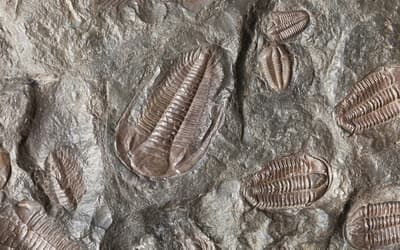
Lagerstätten: Where Creationist and Secular Studies Coincide
Warren H. Johns • June 4, 2025
Creationists are beginning to recognize Lagerstätten as important sites as they are indicators of rapid burial and thus catastrophic activity throughout the fossil record.
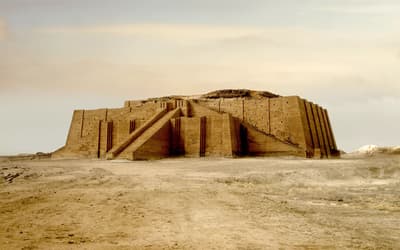
The Tharthar Depression is Not the Escarpment: Reply to Griffith and White
Anne Habermehl • March 19, 2025
There are implications for the location of the Tower of Babel.

The Hyksos— Does the Bible Shed Light on Who They Were?
Troy Lacey • Feb. 26, 2025
An interesting idea has been developed in recent decades that connects the Hyksos with the Bible’s Exodus account.

The XIIIth Dynasty of Egypt and the Exodus
A. John M. Osgood • Sept. 18, 2024
This discussion presents a new arrangement, a different model of the XIIIth Dynasty for discussion.

Chronological Framework of Ancient History. Papers 1–5: Response
Kenneth C. Griffith , et. al. • Aug. 7, 2024
Griffith and White respond to Habermehl’s criticisms by demonstrating a model that integrates geological, archaeological, and historical records with the Ussher-Jones Chronology.
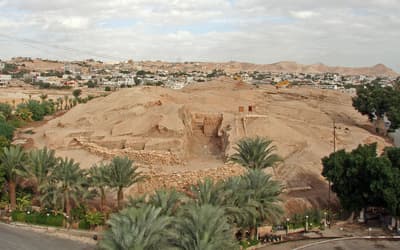
The Walls of Jericho: Reply to Osgood’s Comments
Anne Habermehl • July 17, 2024
Anne Habermehl responds to John Osgood’s critique of her Walls of Jericho paper.

The Place of Dynasty VI and of the Exodus in Egyptian History: Further Comments
A. John M. Osgood • June 26, 2024
A recent paper by Robert M. Porter (2022) demands a reasonable reply. Pottery and archaeological stratigraphy in no way contradict a partial overlap of Dynasty 6 and Dynasty 12 in Egyptian history.
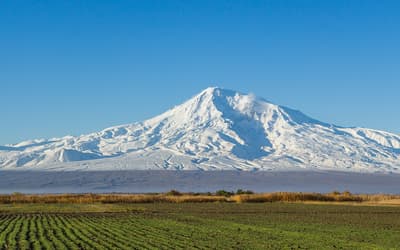
The Ark Landing, The Migration, and the Early Settling of Noah’s Sons. Part 1: The Beginning and the Sons of Shem—Reply
A. John M. Osgood • June 19, 2024
Osgood responds to Habermehl’s objection of his concept and rejection of some archaeological findings.

The Ark Landing, The Migration, and the Early Settling of Noah’s Sons. Part 1: The Beginning and the Sons of Shem—Comments
Anne Habermehl • June 19, 2024
Anne Habermehl argues that archaeology is not the only discipline that needs to be applied in determining much that happened in history. A. John M. Osgood responds in a second article.
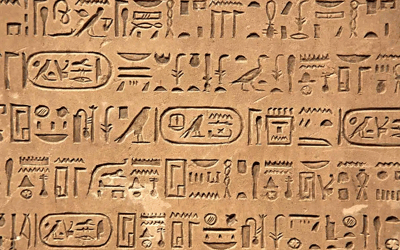
Decoding a World Navel “Visual Language” Through Ideational Cognitive Archaeology: A Further Reply
James Powell • May 22, 2024
At this point, I would like to stress to my colleague that my ARJ paper was about deciphering the primarily pictographic code concerning a navel in ancient thought.
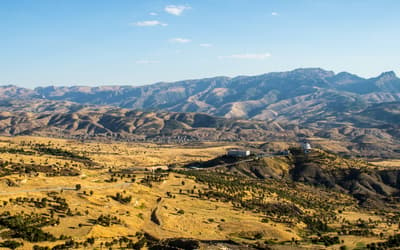
Decoding a World Navel “Visual Language” Through Ideational Cognitive Archaeology: Further Comments
Anne Habermehl • May 22, 2024
This is the first of two papers published today on the ARJ site in a previous series discussing methodology for locating the landing of Noah’s Ark.

The Walls of Jericho: Dating Joshua’s Conquest of Canaan—Comments
A. John M. Osgood • March 13, 2024
In this third of a three-part series, there is further discussion of Habermehl’s 2024 paper on Jericho.

The Place of the Exodus in Egyptian History: Further Comments
Anne Habermehl • March 13, 2024
In this second of a three-part series, Habermehl further discusses the placement of the Exodus in Egyptian history and methodology.

Where in the World Is the Tower of Babel? Comments
A. John M. Osgood • March 13, 2024
This is the first of a three-part series. This first paper discusses Habermehl’s 2011 paper, “Where in the World is the Tower of Babel?”

“Chronological Framework of Ancient History”: Reply
Kenneth C. Griffith , et. al. • Jan. 24, 2024
While we will answer the objections to our 2022 and 2023 papers here in a cursory manner, most of them will be thoroughly handled in the appropriate papers in the series.

“Chronological Framework of Ancient History”: Comments 2
Robert M. Porter • Jan. 24, 2024
This paper asserts that it is not possible to run the Egyptian Old and Middle Kingdoms in parallel and that the date of the Trojan War is not necessarily that provided by ancient Greek historians.

“Chronological Framework of Ancient History”: Comments 1
A. John M. Osgood • Jan. 24, 2024
This paper maintains that we all want a good correlation of the archaeological record with the Bible, but Griffth and White’s ARJ papers of 2022–3 are not the way to achieve it.

The Walls of Jericho: Dating Joshua’s Conquest of Canaan
Anne Habermehl • Jan. 10, 2024
Showing that Joshua’s wall was the one destroyed at the end of the Early Bronze IIIB period and Hiel’s wall dates to the Middle Bronze I.
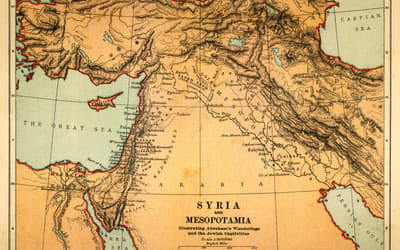
Chronological Framework of Ancient History. 5: The Babylonian Dynasties of Berossus
Kenneth C. Griffith , et. al. • Dec. 20, 2023
The Babylonian dynasties of Berossus are incomplete. The authors solve for the missing values. The resulting table of Berossus covers the era from the Flood to the conquest of Babylon by Cyrus.

Integrating Historical Witnesses in Biblical Chronology
Renae Beckman • Oct. 25, 2023
This paper compares the two chronological approaches and highlights a wide array of historical texts and archaeological finds relevant to dating events in the Old Testament.

The Ark Landing, the Migration, and the Early Settling of Noah’s Sons. Part 1: The Beginning and the Sons of Shem
A. John M. Osgood • Oct. 4, 2023
As a result of archaeological research, the landing of the sons of Noah and their early movements are able to be followed. It will be argued that biblical history makes sense of the findings.

Decoding a World Navel “Visual Language” Through Ideational Cognitive Archaeology: Reply
James Powell • Sept. 13, 2023
The author responds by providing background context and motivations for the original paper. His assumptions are revisited with further corroboration.

Decoding a World Navel “Visual Language” Through Ideational Cognitive Archaeology: Comments
Anne Habermehl • Sept. 13, 2023
This is a critique of the application of ideational cognitive archaeology to determining the location of Noah’s Ark.

The Place of the Exodus in Egyptian History: Comments
A. John M. Osgood • March 2, 2022
The Egyptian king lists have been arranged sequentially as was common in the ancient world, but they often were listing parallel and with overlapping dynasties.
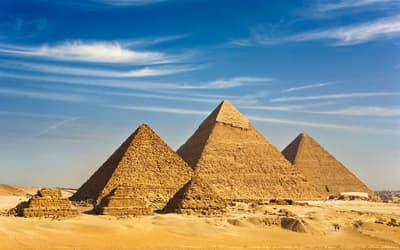
The Place of the Exodus in Egyptian History
Robert M. Porter • Feb. 16, 2022
Egyptian history will be explored, looking for potential shortenings, with a view to putting the Exodus at the end of the Old Kingdom, a time when Egypt collapsed.
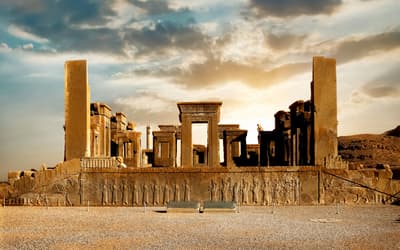
Refuting Challenges to the Accepted Chronology of Achaemenid Empire
Kenneth C. Griffith , et. al. • March 31, 2021
This paper examines the chronology of the Neo-Babylonian and Achaemenid Empires and weighs Martin Anstey’s claim that 82 years of history was fabricated.

Biblical Problems with Identifying Tall el-Hammam as Sodom
Simon Turpin • March 10, 2021
A number of evangelical archaeologists and biblical scholars have concluded that the best candidate to date for biblical Sodom is to be found north-east of the Dead Sea at Tall el-Hammam.
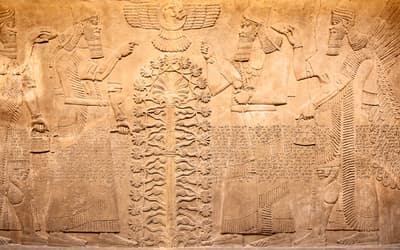
The Mesopotamian Deluge Accounts: Neither History Nor Revelation
Jason W. Landless • Sept. 30, 2020
The deluge poems of Mesopotamia are soaked in a moral and theological framework that is not just different from Genesis but utterly hostile to it.
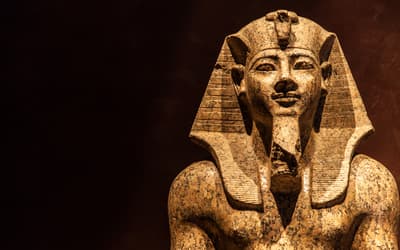
Rameses III and Tel Lachish—A Test Case For the Egyptian Chronology of David Down
Gregory Iocco • July 29, 2020
Remains at Tel Lachish show a stratigraphy that discredits Velikovsky’s theory concerning Rameses III and invalidates the framework of Down’s revised Egyptian chronology.
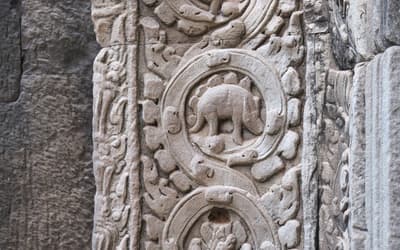
The Stegosaur Engravings at Ta Prohm
David Woetzel • Sept. 13, 2017
Artwork at Cambodia’s Angkor Wat temple appears to depict a dinosaur. Though the engraving is “stegosaur-like,” this interpretation has been criticized.
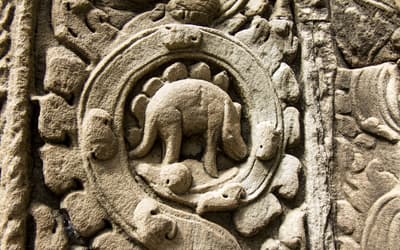
Is the Cambodian Stegosaur-like Carving Another Argument Creationists Should Not Use?
Joshua Cedar • Jan. 25, 2017
A bas-relief carving from the 12th–13th century Ta Prohm temple in Angkor, Cambodia is hailed as a possible depiction of a recently living stegosaur.

Determination of the Decay Constants and Half-Lives of Uranium-238 (238U) and Uranium-235 (235U), and the Implications for U-Pb and Pb-Pb Radioisotope Dating Methodologies
Dr. Andrew A. Snelling • Jan. 18, 2017
Without accurately known decay half-lives, all radioisotope ages cannot be accurately determined or be considered absolute ages.

Abraham and the Chronology of Ancient Mesopotamia
Matt McClellan • Oct. 3, 2012
For many years, Abraham was believed to have lived at the same time as Hammurabi, king of Babylon. Later scholars would date Abraham to the period shortly before the reign of Hammurabi.

Ancient Egyptian Chronology and the Book of Genesis
Matt McClellan • Aug. 24, 2011
This paper will look at the different possibilities that can be constructed concerning how long each dynasty lasted and how they relate to the biblical dates of the Flood, Tower, and Patriarchs.

Where in the World Is the Tower of Babel?
Anne Habermehl • March 23, 2011
This biblical story is believed by many to be the record of a real historical event that took place after the worldwide Flood, at a time when the earth’s population still lived together in one place.
Archaeology on Answers Research Journal
Archaeology is a crucial field of study for serious students of God’s Word. The word “archaeology” comes from the Greek words archaios (“ancient”) and logia (“word, study of”). Therefore, the Greek word archaiologia, from which “archaeology” is derived, most simply means a study of the ancient past. Modern archaeologists study sites and artifacts to understand the past. Biblical archaeology is specifically interested in sites and artifacts that shed light on people, places, and events recorded in Scripture. Biblical archaeology is primarily concerned with the area of the Levant, especially the Holy Land or Israel, but also extends beyond this area, particularly to Rome.
Archaeology provides several benefits for biblical studies. One of the most important steps of biblical exegesis is also one of the biggest challenges—understanding the original context in which the biblical authors wrote. Modern readers of Scripture are not only separated by thousands of years from the time of the original writings, but most of them are also thousands of miles away from biblical lands and sites. The archaeological record enables readers to immerse themselves in the world of the Bible. By studying material culture (physical remains), such as artifacts, architecture, biofacts (organic remains such as plants, animal bones, and pollen), inscriptions, and ostraca (pieces of pottery with writing or pictures inscribed on them), one is better able to understand the original context and setting of Scripture.
Archaeology also corroborates the historicity and accuracy of the Bible. In fact, early archaeologists used the Bible to guide their investigations. Several details of the biblical record have been confirmed by archaeological excavations. Some of these details include dates, names of kings, empires, practices and social norms of the ancient Near East, architecture, travel routes, locations of ancient biblical sites, religious practices of past humanity, and much more. Although archaeology cannot prove the Bible, it does give an extrabiblical witness to the veracity of Scripture.
Textual criticism, the study of textual variants and manuscripts to discover the original text of the Old Testament and New Testament, is also helped by archaeology. The Dead Sea Scrolls, for example, shed light on the Septuagint and Samaritan Pentateuch as well as demonstrate the remarkable accuracy with which the biblical texts were copied and transmitted.
As with all evidence, archaeological finds must be interpreted. It should also be kept in mind that archaeology is extremely fragmentary. Most material culture cannot survive for thousands of years. It is either intentionally destroyed or worn away by natural decomposition. Additionally, archaeology has only uncovered a very minute percentage of the material culture that has survived. Thousands of known surviving ancient sites remain unsurveyed, unexcavated, or only excavated sparsely, due to lack of funding, safety issues, or political conflict. But archaeology can never be given priority over biblical texts. The Bible alone is authoritative.
